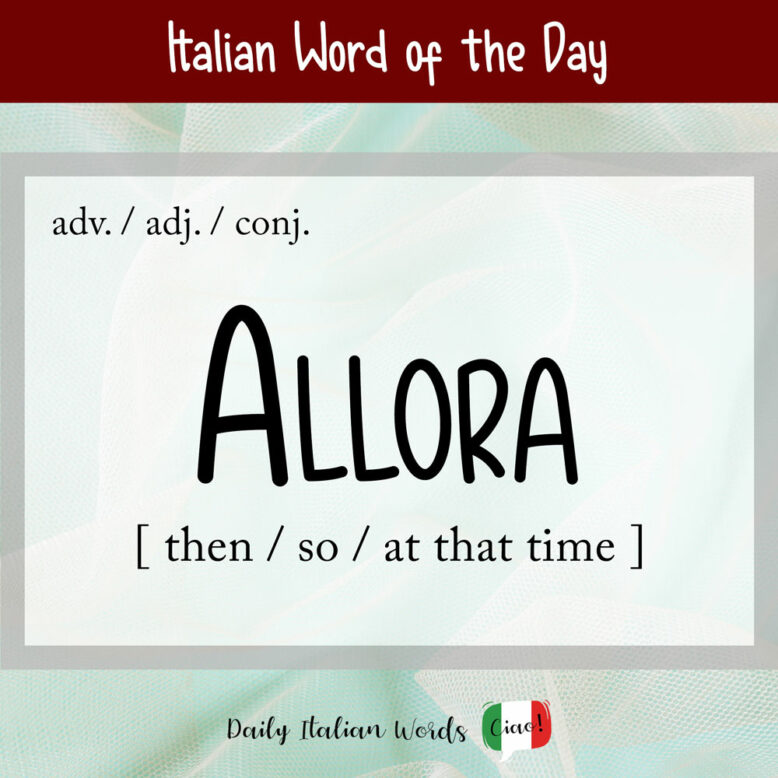An Italian word that many of our readers and followers on Facebook have been requesting is allora, so let’s dive straight in!
Allora is an extremely flexible word in that it can function as an adverb, conjunction or adjective depending on how it is used in a sentence. We’ve decided this article into three sections so that we can analyse each part of speech more in-depth.

‘Allora’ as an adverb
When allora is used as an adverb, it usually translates in English as one of the following:
- (back) then
- at that time
- in that moment
- in those days
A few common expressions featuring allora used in this sense include:
- allora allora = in that very moment, in that precise moment
- allora come allora = at the time
- da allora (in poi) = from that moment on, since then, ever since
- di allora / d’allora = from that time, in those days
- per allora = for that time
- fino (ad) allora = until then
- oggi come allora = now as then
Let’s take a look at a couple of example sentences to get a better feel for how allora is used in context.
Allora non capivo perché Antonio non voleva andarci.
At the time I didn’t understand why Antonio didn’t want to go.
Allora si usava salvare tutto su floppy disc.
Back then they used to save everything onto floppy discs.

‘Allora’ as an adjective
Used as an adjective, allora can also describe someone/something that originates from or belongs to a certain time or era. In this case, it appears before the noun it describes, accompanied by the definite article l’ (the).
- l’allora presidente = the then president, the president at the time
- l’allora dirigente = the then manager, the manager at the time
Si chiama Yoko Ono, l’allora fidanzata e poi moglie di John Lennon.
She’s called Yoko Ono, the then girlfriend and later wife of John Lennon.

‘Allora’ as a conjunction
Finally we come to the usage with which learners of Italian tend to be most familiar. Allora, when used as a conjunction, can translate in many ways including:
- so
- then
- in that case
- well (then)
- therefore
- for this reason
Here are a few common phrases you will encounter when interacting with Italian people:
Allora ci vediamo domani!
See you tomorrow then!
Well, see you tomorrow!
Se vuoi venire anche tu, allora preparati.
If you want to come as well, then get ready.
Le scuole erano chiuse per la neve e allora sono rimasto a casa.
The schools were closed due to snow and so I stayed at home.
In colloquial Italian, allora is often used to begin a discussion or speech in order to attract the attention of the audience, much like the English equivalents now then or right then.
Allora…vorrei cominciare a parlare di un argomento che interessa molti lettori di questo blog.
Now then…I’d like to begin by talking about a topic that interests many of the readers of this blog…
It may also be used to draw a conclusion from another person’s statement or story. In this case, it is often preceded by the words e (and) or ma (but).
Antonio non mi tratta bene. – E allora, lascialo!
Antonio doesn’t treat me well. – Then leave him!
Finally, it can be used in an interrogative sense to a) start a conversation, b) solicit a decision, or c) communicate a lack of interest in what the other person is saying.
Allora? Cosa ti ha detto?
So? What did he say?
Oggi mi sono lavato i denti. – E allora?
Today I brushed my teeth. – So what?

In short, allora is one of the most frequently used words in Italian, but it can also be one of the trickiest to master for a learner due to its multiple meanings. The best way to grasp its usage is to memorise a handful of common example sentences, so that you learn not only the word itself, but also the context in which it normally appears.
Heather Broster is a graduate with honours in linguistics from the University of Western Ontario. She is an aspiring polyglot, proficient in English and Italian, as well as Japanese, Welsh, and French to varying degrees of fluency. Originally from Toronto, Heather has resided in various countries, notably Italy for a period of six years. Her primary focus lies in the fields of language acquisition, education, and bilingual instruction.


